FOCUS ON EFES
The Current Year Has Started Successfully for
In this week’s issue...
Ukraine Latest: Kim Jong Un Meets Putin; Moscow Says It Doesn’t Care about US Warnings over Meeting
NEWS PAGE 2
Irakli Garibashvili Announces Visa-Free Access for Chinese Tourists
NEWS PAGE 2
On the Impeachment and Georgia’s Chances for Receiving Candidacy Should It Go Ahead
NEWS PAGE 3
Borrell: The EU Door Is Open For Georgia, We Hope That Georgian Leaders Will Do Their Part Not To Miss This Great Opportunity
POLITICS PAGE 5
BBC World Questions Gets Georgian Dream and UNM On Stage Together(!) before an Audience of Millions
 BY KATIE RUTH DAVIES
BY KATIE RUTH DAVIES
BBC World Questions, a BBC World Service radio program that “puts people and their questions at the heart of the debate,” was in Tbilisi this week to bring together leading figures and the public to discuss the issues that “matter most to the people of Georgia” – recorded in the Liberty Theater and set for broadcast to an audience of 318 million around the globe this Saturday. Presented and moderated by Anu Anand, a panel of politicians and opinion formers joined a debate led by questions from an eager public audience made up of Georgians, Europeans, and some from as far away as Australia.
18 Months of War - How Has Georgia Helped Ukraine So Far?
POLITICS PAGE 6
UNDP and Germany Promote Social Integration of Ukrainian Nationals Living in Georgia
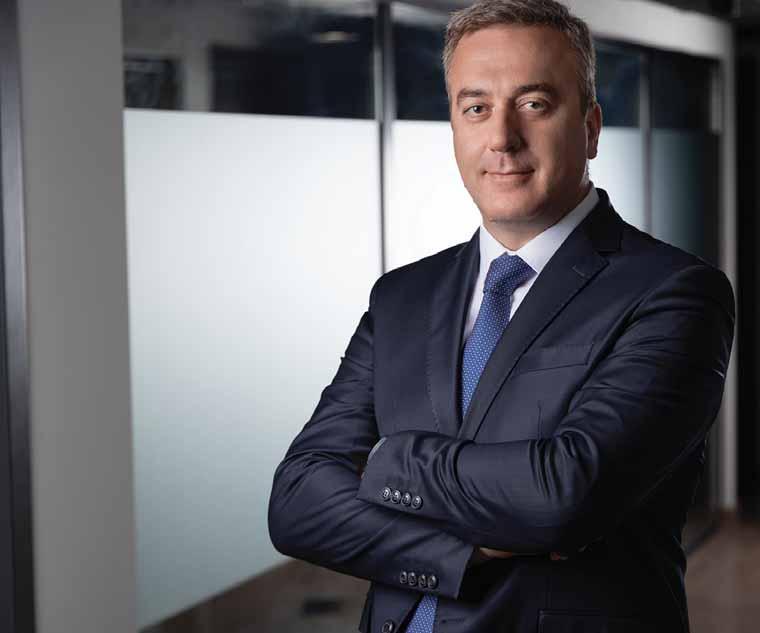
SOCIETY PAGE 10
Georgian Poetry by Murman Lebanidze and Mukhran Machavariani
CULTURE PAGE 11
Losing, in a Curious Way, is Winning
11
Issue no: 1416 • • SEPTEMBER 15 - 21, 2023 • • PUBLISHED WEEKLY
PRICE: GEL 2.50
SPORTS PAGE
Continued on page 4
EFES Georgia GM Veli Dincel PAGE 9
EFES Georgia, says
BBC's World Questions. Left to Right: Kornely Kakachia, Mariam Lashkhi, Anu Anand, Tina Bokuchava and Levan Ghambashidze. Photo by Salome Svanadze
Ukraine Latest: Kim Jong Un Meets Putin; Moscow Says It Doesn’t Care about US Warnings over Meeting
COMPILED BY ANA DUMBADZE
The West is worried about what Russia and North Korea are planning. The Kremlin confirmed that North Korea’s leader Kim Jong Un arrived in Russia’s Far East on Tuesday morning. Kim Jong Un invited Kremlin chief Vladimir Putin to visit North Korea during the rare summit, stoking US concerns that a revived Moscow-Pyongyang axis could bolster Russia's military in Ukraine and provide Kim sensitive missile technology.
The White House has warned that arms negotiations between North Korea and Russia have been “actively advancing” in recent weeks, saying Moscow aims to buy weaponry from Pyongyang for use in the Ukraine war. Russia and North Korea deny those claims.
The US repeated warnings to North Korea on Monday not to send arms to Russia, reiterating that any arms deal or military support for Russia’s war in Ukraine would directly violate a number of UN Security Council resolutions, such as the prohibition of all weapons trade with the country. It has said it is ready to impose more sanctions against North Korea if there is a deal.
Kremlin Press Secretary Dmitry Peskov dismissed the US' warnings, however, telling reporters that Moscow and Pyongyang are not interested in “warnings from Washington.”
Putin accepted Jong Un’s invitation, according to North Korean state news agency KCNA, though there was no immediate confirmation from the Kremlin. Since Russia's 2022 invasion of Ukraine, Putin has rarely travelled abroad.
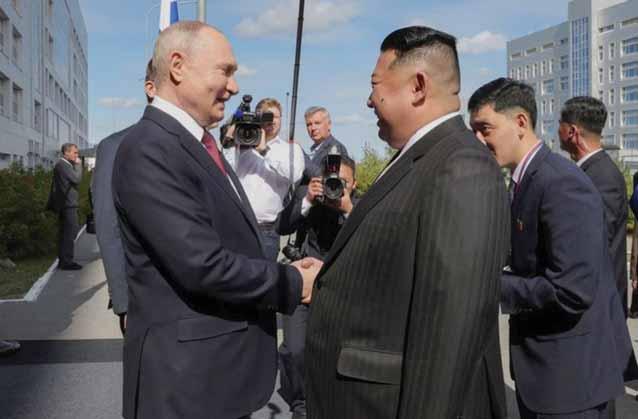
Calling each other "comrades", Putin and Kim toasted to their friendship on Wednesday with Russian wine after the 70-year-old Russian president showed Kim, 39, around Russia's modern space launch facility and they held talks alongside their defense ministers.
"At the end of the reception, Kim Jong Un courteously invited Putin to visit the DPRK at a convenient time," KCNA said, referring to the Democratic People's Republic of Korea, North Korea's formal name.
"Putin accepted the invitation with pleasure and reaffirmed his will to invariably carry forward the history and tra-
dition of the Russia-DPRK friendship," KCNA said.
For the United States and allies, the burgeoning friendship between Kim and Putin is a concern: Washington has accused North Korea of providing arms to Russia, but it is unclear whether any deliveries have been made.
Both Russia and North Korea have denied those claims, but promised to deepen defense cooperation, and during a visit to North Korea in July, Defense Minister Sergei Shoigu was shown banned ballistic missiles by Kim.
Kim was due on Thursday to visit military and civilian aviation factories in the Russian city of Komsomolsk-onAmur and to inspect Russia's Pacific fleet in Vladivostok, Putin said.
THURSDAY DRONE ATTACKS
IN
CRIMEA, UKRAINE
Explosions rang out in occupied Yevpatoriia, Crimea, on the morning of 14 September, reports Ukrainska Pravda.
The Russian Defense Ministry reported a drone attack on Crimea and an attempt to attack the Black Sea Fleet patrol ship Sergei Kotov by unmanned surface vessels (USV).
Suspilne noted that a local resident reported several powerful explosions. In addition, Suspilne published photos and videos from the scene and later added that explosions in Crimea were heard near the village of Uiutne, west of Yevpatoriia.
"Ambulances and rescue workers are driving through the streets. As local residents told Suspilne Crimea, military unit No. 85683 is deployed in the area where the explosion was heard," Suspilne said.
The Crimean Telegram channel ChP Sevastopol [Emergencies Sevastopol] reported four powerful explosions. But as of now, it is unclear if it is about the explosions that local residents have written about or whether they are new ones.
Nataliia Humeniuk, Head of the Joint Press Centre for Operational Command Pivden (South), reported that the Ukraine’s Defense Forces are working to destroy Russian targets.
The occupying authorities of Yevpatoriia and Crimea have not yet commented on the explosions.
However, TASS, referring to the Russian Defense Ministry, claimed that Russian air defense systems destroyed 11 drones over Crimea, as well as naval aviation of the Black Sea Fleet, which
destroyed three more USVs of Ukraine’s Armed Forces.
The Russian Defense Ministry reported at 07:22 that Ukraine’s Armed Forces tried to attack the patrol ship of the Black Sea Fleet, Sergei Kotov, in the waters of the Black Sea with five USVs at around 05:00. The Russian Defense Ministry stated that five USVs were allegedly destroyed by fire from the ship's standard weapons. The Russian Defense Ministry claimed that five uncrewed boats were destroyed by fire from the vessel’s regular weapons. They also reported that they had supposedly downed 11 UAVs that had attacked Crimea.
‘SHAM ELECTIONS’ WON’T ALTER G7 SUPPORT FOR UKRAINE, MINISTERS SAY
The foreign ministers making up the G7 said in a joint statement that Russianinstigated elections in occupied areas of Ukraine would not impact the countries’ support for Kyiv.
“Russia’s attempt to create a situation of fait-accompli through these sham ‘elections’ will not alter our approach nor our support to Ukraine as it fights
to reclaim its internationally-recognized territory,” the statement said.
“We will stand with the Ukrainian people and continue to provide the financial, humanitarian, security and diplomatic support Ukraine requires for as long as it takes.”
The comments come after G7 leaders, comprising Canada, France, Germany, Italy, Japan, the UK and the US came together at the G20 summit in New Delhi on September 9 and 10.
to Ukraine in the coming months. Germany’s foreign minister visited Kyiv Monday and said that while Ukraine’s place was in the European Union, more needed to be done to tackle corruption in the country.
SWEDEN TO CONSIDER SENDING FIGHTER JETS TO UKRAINE, MEDIA REPORTS
Rustavi Civic Groups Working to Reduce Air Pollution
The people of Rustavi are working together to reduce pollution and improve living conditions in their city. Local civic groups Gavigudet and EcoCentre, both USAID partners, are documenting pollution levels coming from the city’s industrial zone, and advocating for measures to cut emissions and improve air quality. Thanks to
their advocacy, 13 out of 15 factories operating in Rustavi have now installed air filters and self-monitoring systems.
The Ministry of Environmental Protection also referred to Gavigudet’s reports when evaluating previous Rustavi atmospheric air improvement plans. Gavigudet and Ecocentre continue to work for a cleaner and healthier environment for everyone in Rustavi.
GERMANY
WANTS TO ENCOURAGE PARTNERS TO BOOST UKRAINE’S AIR DEFENSES, FOREIGN MINISTER SAYS
German Foreign Minister Annalena Baerbock said Berlin would encourage partners to deliver any available air defense systems to Ukraine ahead of winter, speaking in an interview with newspaper Frankfurter Allgemeine Zeitung.
“We have to build a winter shield of air defense systems across Ukraine’s critical infrastructure,” Baerbock told FAZ, adding that Germany would be making more IRIS-T missiles available
The Swedish government will ask its armed forces to investigate the potential for sending Gripen fighter jets to Ukraine, Swedish public radio (SR) reported on Tuesday, citing unnamed sources.
The government wants to know, among other things, how a handover would affect Sweden’s defense capabilities and how quickly Sweden could get new Gripen fighters, SR reported.
The government may make a formal request to the armed forces as early as Thursday to officially consider the issue, Swedish Radio said.
According to the SR report, Ukraine has expressed hope of receiving one division, consisting of between 16 and 18 of the Swedish-made jets, which are produced by defense contractor Saab.
Irakli Garibashvili Announces VisaFree Access for Chinese Tourists
 BY MARIAM GORKHELASHVILI
BY MARIAM GORKHELASHVILI
At today’s session of the government, the Prime Minister of Georgia, Irakli Garibashvili, announced that a visa-free regime will soon be implemented for Chinese citizens. The purpose of the decision is to encourage tourism. According to the PM, Chinese tourists are considered the most desirable tourists in the world.
“Today, I will issue the relevant decree. This will be a very important incentive for even more tourists to come. Chinese tourists are considered one of the most desirable tourists in the world. We also have direct flights. We want to add flights and more tourists will come,” Garibashvili noted.
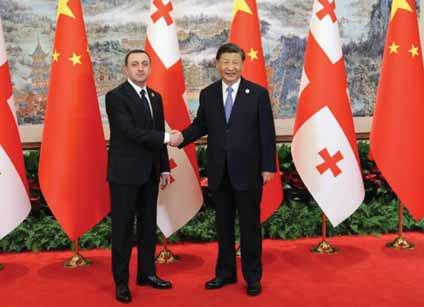
GEORGIA TODAY SEPTEMBER 15 - 21, 2023 2 NEWS
Kim Jong Un visiting Russia. Source: North Korea's Korean Central News Agency. KCNA via REUTERS
On the Impeachment and Georgia’s Chances for Receiving Candidacy Should It Go Ahead
BY TEAM GT
The impeachment procedure will not help Georgia become a stable and strong country with strong state institutions, Ambassador of the European Union in Georgia Pawel Herczynski told journalists.
“I am a foreign diplomat, I need to be really careful because I don't want to interfere in the internal affairs of Georgia. We want Georgia to be a stable, strong country, with very strong institutions. So, of course, the impeachment procedure is not what is going to help Georgia to become a stable and strong country with strong state institutions,” the ambassador said.
In addition, when asked whether the topic of impeachment was discussed at the meeting with President Salome Zurabishvili, the ambassador answered that "The main topic of our meeting was the European integration of Georgia."
“Those oppositionists who support the impeachment of the President will be involved in sabotaging the European agenda together with Georgian Dream, - Lelo MP Salome Samadashvili told reporters, noting that Lelo will not participate in the voting, even if the opposition agrees to do so.
"The impeachment of Salome Zurabishvili is a step towards the sabotage of the European agenda, therefore any oppositionist who supports the impeachment will be involved in sabotaging the European agenda together with the Georgian Dream, and I am sure that they will be paid for it, because without direct bribery, I do not believe that an opposition deputy will be found in the parlia-

ment who will support this. Voting is secret, so the initiative for the opposition not to attend the voting is understandable. We do not have a problem. Even if the opposition agrees on this, we will not participate in the voting," she said.
Regarding Irakli Garibashvili's suggested impeachment, Samadashvili noted that "this is only one episode in a long corrupt history connected with the Garibashvili-Tamazashvili clan."
The MP said she believes that the opposition should demonstrate through the impeachment that it is fighting corruption, which is one of the recommendations of the European Union.
"We have already held consultations with several political groups and we will continue these consultations. At the same time, we are working on the formal side of the procedure, which is related to the preparation of the relevant document. When the European Union demands we fight against corruption, when the European Union unequivocally tells us that the government does not fulfill the requirements, it is the opposition's obligation to demonstrate in this situation that we are seriously combating corruption, and the impeachment procedure is important for this," she said.
The President of Georgia, Salome Zurabishvili, met with representatives of the opposition on Tuesday in Orbeliani Palace: Lelo for Georgia member Salome Samadashvili, For Georgia party members Ana Buchukuri and Natia Mezvrishvili, and Eurooptimists deputy Khatia Dekanoidze.
The opposition politicians said after the meeting that the main topic of the conversation was the 12 recommendations of the European Commission and Georgia’s candidate status.
According to the oppositionists, the meetings were held individually.
“The topic of discussion was what can be done by society, the Georgian people, so that we don't lose this historic chance and the country, despite the sabotage of Georgian Dream, gets the candidate status,” Samadashvili said after the meeting.
Ana Buchukuri said she spoke with the President about the European integration process.
“We talked about how we can help and promote the country, the European inte-
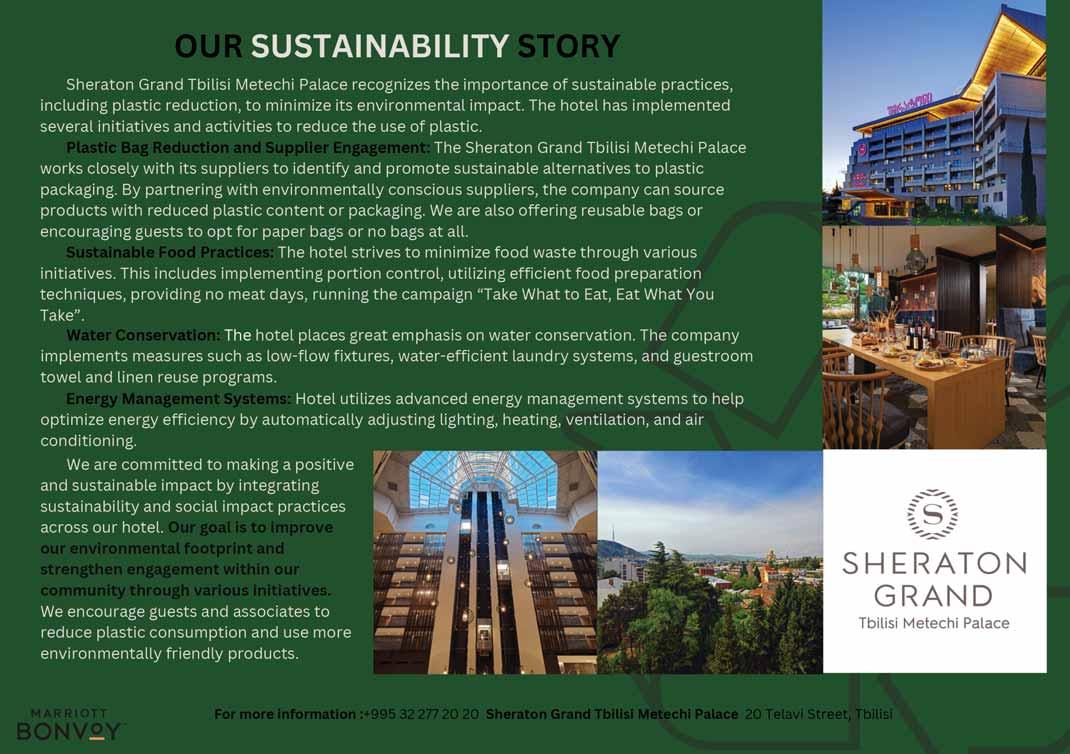
gration process. The candidate status is fundamentally important for the country. We hope that due to geopolitical reasons, a positive decision will be made in the end and the door of the European Union will not be closed for Georgia,” she said.
Khatia Dekanoidze, stated that she once again told the President that she will not support the impeachment process, as it is part of the anti-Western propaganda.
“I told her that I do not support the
impeachment, and this is my very firm position. I think that the impeachment is part of the anti-Western policy and propaganda that Georgian Dream is running. In addition, the President continues active international campaigning and work in the context of having candidate status granted to Georgia. We talked about this. It was just an exchange of information, nothing specific was discussed,” she said.
“I believe that any intention of the government to deprive the country of the chance to leave the post-Soviet space is doomed, - the former chairman of the United National Movement, Nika Melia, said after his own meeting with the President of Georgia.
He added that the meeting, he and the President talked about "all issues," and the least time was devoted to her impeachment.
"To be honest, we talked about all the issues that may concern every patriotic citizen of this country. As for the impeachment hearing that will be held in October, I personally believe that any intention of the government to deprive the country of the chance to leave the postSoviet space is doomed.
"I got the impression that President Zurabishvili does not think much about who will vote for it and who won't, who will be bribed and who won't. It is possible that Georgian Dream really believes that the meetings are held here in order to ensure that her impeachment does not happen, but actually the least time was devoted to this issue. She is absolutely calm about this matter. I personally think that if this happens, Bidzina Ivanishvili's government will get the opposite result than they plan, and it will not make the West abandon the Georgian people," Melia concluded.
GEORGIA TODAY SEPTEMBER 15 21, 2023 3 NEWS
President Salome Zurabishvili. Source: Instagram
BBC World Questions Gets Georgian Dream and UNM On Stage Together(!) before an Audience of Millions
For the first time, Members of Parliament from both the ruling Georgian Dream (Mariam Lashkhi) and the opposing United National Movement (Tina Bokuchava) parties appeared together on stage. They were joined by Kornely Kakachia, Professor of Political Science at Tbilisi State University, and Philosopher Levan Ghambashidze.
“Over 150 members of the public came to the event,” Helen Towner, Series Producer of BBC World Questions, told GEORGIA TODAY. “We received hundreds of questions and chose six to debate. The debate was heated and lively. We expected this, as we were discussing matters that mean so much to the people of Georgia, namely membership of the EU and relations with Russia. The audience were free to give their opinions as well, and this made for some very compelling radio.
“We were so glad that we managed to get two politicians from the two main opposing parties to share a platform and debate in front of the public. At times, the two politicians clashed - this is far from unusual - it happens around the world. We hope we were able to illustrate to our global audience what matters most to the people of Georgia right now.”
Questions were asked on the country’s possible accession to the European Union, its relations with Russia, the fight against climate change, and what it is that makes Georgia a stand-out country.
Note that the comments you read below have been redacted due to space limitation, yet remain fully faithful to their original content and meaning. The event itself can be heard on BBC’s World Service website from Saturday, September 16.
With two months until Georgia gets an answer on the longed-for EU Candidate Status, and with only three of last year’s 12 European Commission recommendations fully fulfilled, Georgia continues to be plagued by political polarization, and this was very evident throughout the BBC discussion. Georgia’s European future was the first question the audience sought an answer to, in short: What is the plan?
“Georgia is part of the European family, it’s part of our history,” Georgian Dream (GD)’s Mariam Lashkhi said. “Europe is the choice of more than 80% of Georgians and it is a choice that has been confirmed by the government, first when the Association Agreement was signed. Every institution is involved in getting us there, but it needs time. We cannot fulfill the recommendations without strong institutions in place. We established working groups but, unfortunately, the opposition refused to cooperate.”
“The EU and NATO are our best assurance against a deluded Putin. We are part of the political process, yes, but the agency to implement political reform lies with GD,” the opposition’s Tina Bokuchava responded. “The message Josep Borrell delivered during his visit to Georgia last week is that EU accession is a merit-based process. Blame cannot be shifted to the opposition for the inability of GD to implement reforms. There is a lack of political will to implement [the 12 recommendations]. Don’t blame the thermometer if you don’t like the temperature! You are merely deflecting responsibility.”
And so began an entertaining, yet sadly unfruitful, two hours of political backand-forth while both parties sought to avoid accountability or moves toward achieving anything resembling progress. Thankfully, we had an academician and philosopher there for some balance.
Professor Kakachia, on the topic of Georgia fulfilling those 12 recommenda-
tions, suggested that the EU should better define its definition of “deoligarchization,” and rightly pointed out that, at the time the Association Agreement was signed, Georgia was ahead of Moldova and Ukraine [who were given candidate status in 2022]. “[Yet], since the war began, Georgia has failed in its foreign policy toward Ukraine,” he acknowledged. “It has lost its moral compass in terms of foreign policy and security, which needs to be in line with EU foreign policy. It was the frontrunner of the Eastern Partnership for many years. The attitude of the Georgian government toward Ukraine has been all but toxic, and this has naturally raised a lot of questions among our EU partners.”
The audience was asked its opinion of the first topic, and while (un?)surprising protest was shown by some Georgian audience members when non-Georgians offered their views, it was widely agreed that while the Georgian people deserve EU membership, the government has not done enough to secure the possibility thus far, especially when it deviates from the EU policy on bans on flights from Russia (Georgia is currently wide open and welcoming to Russian visitors), and begins a process of impeachment of the current president for her trip to the EU, during which she openly sought support for Georgia’s EU candidacy.
“The impeachment does follow EU values,” Ms. Lashkhi argued. “I was very proud to have the first female president, but she must stick to her constitutional rights. She must coordinate foreign policy with the government!”
The “Russian Law” that GD tried to introduce earlier this year was brought up – a move that split the country and caused heated street protests outside parliament, further exacerbating the political polarization. Ms Lashkhi repeated the well-trodden message given by GD that the law had been “misunderstood and misrepresented” by the public and media, and that it was not Russian, but a copy of US law. When Ms. Bokuchava quoted ex-US Ambassador Kelly Degnan’s at-the-time response to that, the GDsupporters in the audience booed her.
“How do you expect people to unite?
True, the polarization is more seen between the political parties than between the public, yet the instruments [to change that] lie in the hands of the government,” philosopher Ghambashidze suggested.
Saakashvili was cited by the opposition MP as another example of GD’s failings to please the West, with her calling it “political revenge,” and saying that since the Saakashvili government, which transformed Georgia from a failed state, Georgia had been “backsliding.”
“We work together for the citizens, we transformed the country into a pluralistic
parliament of 9 parties,” Lashkhi countered. “And in Saakashvili’s case, the European Court of Human Rights itself dismissed his perceptions of illness. Anyone, be they president or citizen, is responsible to the rule of law.”
“It is crucial to push politicians toward a consensus policy, a coalition government, though this is not naturally part of our culture,” Prof. Kakachia put in. “Parties don’t address public concerns. There is extreme partisanship across the board – in the public, the media. Georgian political parties see it as zero-sum game. Even if we get a regime change in next year’s elections, the political culture needs to change. And it can’t change overnight. Change will come through civil society, through academia…”
It was then agreed within the audience that the electorate of both parties at least seem to agree on the direction of Georgia’s foreign policy. It was suggested that the rhetoric should be the first thing to change, seeing GD speaking of the opposition as “partners” rather than “enemies,” ceasing all rhetoric labelling the country’s western partners as “enemies,” and having ruling party MPs agree to speak on opposition TV shows, which reach an audience outside their usual pro-GD scope.
Moving on, the question “Can Georgia balance between maintaining good relations with neighbors such as Russia, and the EU?” was introduced.
GD’s Mariam Lashkhi gave an adamant “No” to the idea of Georgia’s ever being “friends” with Russia.
“Georgia is in a turbulent region,” she noted. “But Georgia is tolerant, maintaining good relations with all except Russia – 20% of our land is occupied by Russia. There are no diplomatic relations. Our foreign policy clearly dictates our Western direction. It is not possible to have good relations with Russia. Yes, we trade with Russia, but it is just 0.03%. In comparison, the EU sent 20 million Euro to Russia for gas. But no one accuses them of supporting Russia. We warned [the West] in 2008 about relations with Russia, but the West chose to push the ‘refresh’ button on that relationship. We have never forgotten, nor did we need [the conflicts in] Crimea or Ukraine to ‘remind us.’ We do not have ‘breakaway’ regions – they are occupied and should be named as such by all. Blame Russia – we do!” she said.
It was perhaps the one point of the evening the UNM’s representative, Tina Bokuchava, could briefly agree with her on: “Georgia needs to join NATO. While we have all seen the blackmail from Putin, including the threat of using nuclear weapons, we also see he is hesitant to pick a fight with a NATO country. And yet, if GD was interested in joining the
EU, we wouldn’t be seeing this democratic backsliding, the cancelling of NATO exercises. Last week, Josep Borrell noted with regret that the alignment of Georgian policy with the EU had dropped [to 43%] since the Ukraine invasion.”
In an attempt to bring the discussion back to the point in hand, presenter Anu Anand noted that 89% of Georgia’s population says that Russia poses the biggest threat to Georgia, and then invited the audience to comment on Georgia’s ability to balance between good relations with Russia and the EU.

One of two Russians in the audience spoke up: “Impossible! Russia is an aggressor, an occupier. The Georgian government is trying to sit on two chairs – Western and Russian. Most Russians who live here in Georgia cannot be friends with Russia. So how could Georgians want to be friends [with them] under this government?
“Can there be peace?” one audience member wondered. “Not for at least another 10 years under this government, where Georgians are looked down on as subservient to Moscow!”
“The GD policy is to ‘keep the peace,’” Mr Ghambashidze noted. “But that question of peace comes on Russian terms. The same was seen in the Roman Empire – peace achieved through oppression of the people. Russia offers peace, that Georgia will not be attacked, by blackmailing us with terms we cannot and should not accept, like the Georgia of soviet times – living with no independence, people killed, and the Georgian identity decided by the Russians.”
Perhaps as an intended respite from the politics, Ms Anand invited a civil activist to ask the panel about climate change and the environment. She questioned why the Georgian people are not more vocal on the issue. Unfortunately, the two politicians present quickly returned to criticizing each other for what was or wasn’t done to prevent the recent Shovi landslide tragedy, until Ms Anand steered them back.
“Climate change does need to be discussed widely and more reforms made to safeguard the environment,” GD’s MP recognized, while Ms Bokuchava noted that, “Polls show that Georgian citizens are increasingly concerned by climate change and air pollution, particularly in urban areas. Yet politicians lag behind in responding. Politicians must respond to the rising concerns, but are held back from doing so by GD.”
Prof. Kakachia pointed out it is a question of accountability. “Georgia is one of the poorest countries in the Eastern Partnership, so logically we should have a strong socio-democratic party, but we never have had. And what is academia doing on the climate change message?
TV, radio – few programs talk about it. And from there it should be brought to the policy level.”
“People are more worried about what Misha Saakashvili is eating in the clinic than climate change,” Ms Lashkhi noted, to a round of “boos” from the audience. A potentially refreshing topic was then introduced to the panel: What is the unique way of being that Georgia offers the world?
Philosopher Ghambashidze stumbled to answer, wondering where to begin, and reluctant to suggest the mundane “khinkali” and “tourism,” but encouraged ahead anyway by the British presenter who is new to everything wonderful about Georgia. Ms Anand mentioned she was surprised, however, that he, historian and philosopher, hadn’t suggested “bravery,” or “resistance” as Georgia’s unique ways of being, at which point Ms Bokuchava stepped in. “Yes, resilience. For centuries, Georgia has been at the crossroads of empires and yet kept its language, culture, religion. And that resilience will prevail, even under the current government, as we strive for democracy.”
Ms Lashkhi countered with a more optimistic note: “Creativity, backed up by strong history. Alphabet, language, architecture, wine-making- Georgia is the cradle of wine. Being innovative and striving for the future, and this is what Georgia can bring to the EU: innovation, resilience and freedom.”
To this list, Professor Kakachia elaborated with “hospitality, culture. We are a small nation, proud of our history. Georgian political elites often talk of ‘the return of Georgia to the European family.’ To us, that ‘family’ represents, for example, our shared Christian roots, our shared experience within the Byzantine Empire. Georgians don’t want to be a simple member of the EU, but to bring their own original culture to enrich European culture, and perhaps this is not a concept well understood in the EU capitals.”
One audience member then added, “Georgia is a country of great minds, a hub in the region for innovation and technology. Silicon Valley comes here to finance startups. This is a great country for investment!”
To this, others added polyphony, folk traditions, dancing, tolerance, nature and friendship. As Ms Anand noted, “friendship” was a nice note to end on, and yet it was clear to all present that the political spectrum of Georgia has a long way to go before that word becomes a recognized part of its rhetoric towards its fellows, a fact which doesn’t bode well for Georgia’s EU aspirations. Let’s hope that those who listen to the BBC program this weekend hear the Georgian people and their aspirations over the fruitless squabbling of the country’s politicians!
GEORGIA TODAY SEPTEMBER 15 - 21, 2023 4 POLITICS
Continued from page 1 BBC's World Questions in Tbilisi. Source: GT
Borrell: The EU Door Is Open For Georgia, We Hope That Georgian Leaders Will Do Their Part Not To Miss This Great Opportunity
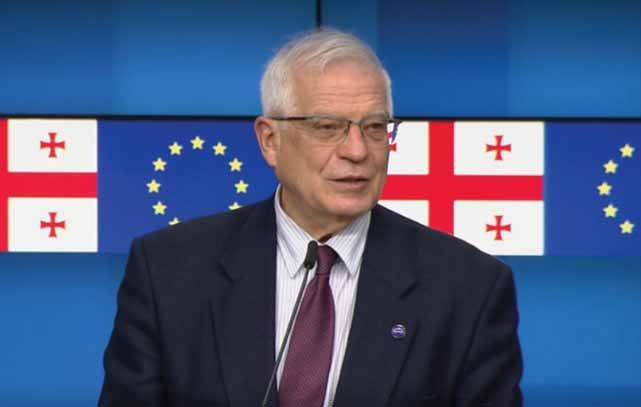
The EU accession process is a national endeavour that needs to stand over party politics. All institutions have to work together, to cooperate. Georgian leaders should not miss this historic opportunity, – Josep Borrell, High Representative of the European Union for Foreign Affairs and Security Policy/Vice-President of the European Commission, says in his blog. Speaking of his visit to Georgia, the EU High Representative notes that he wanted to share three main messages with the Georgian people and the Georgian authorities.
“Last week, I visited Georgia for the first time as HR/VP to tell the Georgian leaders and citizens that Georgia belongs to the European family. However, to obtain the status of a candidate country, Georgia needs to make significant progress on depolarization of the political life, de-oligarchization, justice reform, electoral reform and media pluralism.
“I wanted to share three main messages with the Georgian people and the Georgian authorities. First: there is no doubt for the EU that Georgia belongs to the European family. Visiting Georgia, you can feel the overwhelming European aspiration of the Georgian people. I have seen more European flags in the street of Tbilisi than in most European capitals. More than 80% of the Georgians want their country to become a part of the European Union. It is for sure an impressive figure and we value fully this commitment. During my stay, all my interlocutors made a plea for Georgia to receive candidate status to the EU shortly. It is a call that we have heard over the past months consistently from the authorities, from the opposition and from the civil society representatives.
“It is a call that we do not want to leave unheard. However, there are clear requirements for Georgia along this way, mapped out in the 12 priorities put forward by the European Commission. The next steps on the European path for Georgia will depend on the results achieved on them. As of last June, Georgia has delivered on three of them. But on the other nine, quite a lot of work remains to be done. It concerns mainly depolarization of the political life, de-oligarchization of
the economic, political and social life, justice reform, electoral reform, media pluralism and human rights”, he says.
According to him , one of the main challenges on the European path for Georgia is indeed the strong political polarization.
“For the country to become an EU candidate, all political forces need to work together constructively. As I discussed with the Georgian Parliamentarians, the majority has to be inclusive and the minority cooperative. The EU accession process is a national endeavor that needs to stand over party politics. The government and the party in power should work on creating an environment that makes this cooperation possible. Launching the impeachment procedure against President Zurabishvili, has further increased this counterproductive polarization. To be able to go ahead swiftly with Georgia’s European path, all institutions of the country have to work together, to cooperate. Georgian leaders should not miss this historic opportunity.
“There are no shortcuts to EU accession. Neither for Georgia, nor anyone else. The enlargement process always follows clear criteria. It requires, for sure, hard work, political will and clear commitment to the European Union’s values.
But, as I told my Georgian counterparts, I know from my own Spanish experience that EU membership has a big transformative power and is an important security commitment. This hard work is worth it, not only to become a member of the European Union, but, more importantly, for improving the everyday life of citizens. Georgia has a robust administration and a vibrant civil society. It has all the potential to achieve this historic task.
“My second message was related to Russia’s war of aggression against Ukraine. The EU is supporting Ukraine, and we will support Ukraine for as long as it takes. The EU welcomes the clear position of Georgia in international fora in this regard. It is crucial to coordinate our efforts with our closest partners to isolate Russia internationally. Therefore, I welcomed the close cooperation with Georgia on prevention of sanctions’ circumvention. A lot has been done in Georgia in that respect and I expressed
our clear recognition for these efforts.
“However, I have had to say also that we regret the resumption of direct flights between Georgia and Russia, making Tbilisi a hub for bringing Russians to Europe. More engagement is also needed to counter Russia’s hybrid activities, starting with Russia’s war of propaganda and disinformation. The EU will continue supporting independent media and civil society in Georgia to help build resilience to information manipulation. Independent media and fair access to information are at the core of democracy.
“Alignment with our foreign policy is a commitment that we expect from all countries aspiring to become members of the European Union. This alignment is also a commitment that Georgia itself undertook already in 2014 under the Association Agreement with the EU. However, in that regard, I see right now quite a lot of room for improvement.
“My third message was about our unwavering support to Georgia’s security, sovereignty and territorial integrity. Since 2008, Georgia has been a victim of Putin’s
neo-imperialist worldview. Our longstanding commitment to stand by Georgia is today as strong as ever in light of Russia’s aggression against Ukraine.
“These are not just words. We are backing this up by concrete actions: we have an active EU Special Representative for the South Caucasus, Toivo Klaar and our dedicated civilian mission, the EU Monitoring Mission (EUMM) that has been in the country for the last 15 years. The mission patrols along the administrative boundary line with the breakaway regions South Ossetia and Abkhazia. Every day, it plays an important role in ensuring stability in the region by observing the situation on the ground, reporting on incidents, and, generally, through its presence in the relevant areas.
“I visited the area adjacent to the Administrative Boundary Line with the breakaway region of South Ossetia with the EU Mission. I discussed of course already the situation around the conflict with the Georgian authorities, but I had also the opportunity to exchange with the civilian population living near the
Administrative Boundary Line. They told me about their daily hardship and grievances – from divided backyards that cannot be accessed anymore to receiving their pension. They are paying a high price for this conflict.
“We have established as well an increasingly strong security and defense cooperation with Georgia, which has made remarkable contributions to our military missions around the world. The EU is helping Georgia strengthen its defense forces through the European Peace Facility (EPF). To date, we have provided €62 million for non-lethal equipment vital for rapid response in crises. The first batch has already reached Georgia and more assistance is on the way.
“To conclude, I think that my main message to leaders and citizens of Georgia has been clear: Georgia can count on the European Union and the EU door is open for Georgia. We want to see Georgia succeeding on its European path and hope that Georgian leaders will do their part not to miss this great opportunity”, said EU High Representative Josep Borrell.
Kim Jong Un Visits Russia to Meet with Putin
North Korea’s Kim Jong Un arrived in Russia on Tuesday for a meeting with President Vladimir Putin where they are expected to offer each other increased support in their escalating standoffs with the West.
Kim is expected to seek Russian economic aid and military technology in exchange for munitions to be used in Russia’s war in Ukraine.
North Korea’s official Korean Central News Agency said Kim boarded his personal train bound for Russia on Sunday afternoon, accompanied by members of the ruling party, government and military.
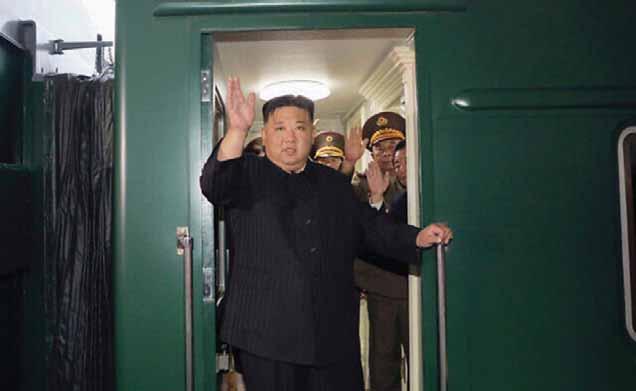
After decades of complicated, hot-andcold relations, Russia and North Korea have drawn closer since Moscow’s invasion of Ukraine in 2022. The bond has been driven by Putin’s need for war supplies and Kim’s efforts to boost his partnerships with traditional allies Moscow and Beijing as he tries to break out of diplomatic isolation.
Kim is apparently accompanied by Jo Chun Ryong, a ruling party official in charge of munitions policies who joined the leader on recent tours of factories
producing artillery shells and missiles, said South Korea’s Unification Ministry. North Korea may have tens of millions of artillery shells and rockets based on Soviet designs that could give a huge boost to the Russian army in Ukraine, analysts say.
Also identified in photos were Pak Thae Song, chairman of North Korea’s space science and technology committee, and Navy Adm. Kim Myong Sik, who are linked with North Korean efforts to acquire spy satellites and nuclear-capable ballistic missile submarines. Experts say North Korea would struggle to acquire such capabilities without external help, although it’s not clear if Russia would share such sensitive technologies.
Kim Jong Un may also seek badly needed energy and food supplies, analysts say. Deputy Foreign Minister Andrei Rudenko said Russia may discuss humanitarian aid with the North Korean delegation, according to Russian news agencies.
Kim’s delegation also likely includes his foreign minister, Choe Sun Hui, and his top two military officials, Korean People’s Army Marshals Ri Pyong Chol and Pak Jong Chon.
GEORGIA TODAY SEPTEMBER 15 21, 2023 5 POLITICS
Image: Korean Central News Agency/Korea News Service via AP
18 Months of War - How Has Georgia Helped Ukraine So Far?
The 15th anniversary of the August War in Georgia marked 18 months since Russia started the war in Ukraine. From February 24, 2022 until today, the country's strategic partner has been in need of support from its friends - during these times, the support extended by Georgia, compared to powerful countries, is modest, but nonetheless the help offered by Georgian organizations and citizens to the Ukrainian people stands out - the list of these activities is long, and a portion of them is reviewed in this article.
On the very first day of the full-scale war, the country’s main street, Rustaveli Avenue - where the Georgian Parliament stands - was overflowing with protesters who gathered spontaneously. It is the very place where the President of Ukraine Viktor Yushchenko stood as a show of support to Georgia during the war of August 2008. Supporters of Ukraine gathered in other major Georgian cities too: Batumi, Kutaisi, Gori…
Zelensky my support and that of my people. You are a nation which represents Georgia’s dignity today. Let me thank you immensely for it,” said the President of Georgia, Salome Zurabishvili.
Protests were organized by TV company “Formula”, which also created a charity fund to help the people of Ukraine
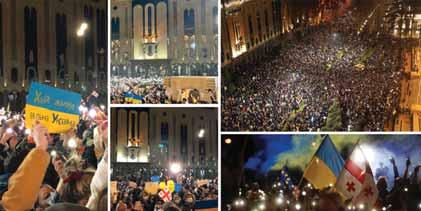
- the channel was the first to transfer GEL 500,000 for the cause. In the following day, the funds increased to 677,000 GEL. An additional 700,000 GEL was raised through a marathon on the Public Broadcaster.
Other media outlets also showed their support. For instance, “Mtavari Arkhi”, “TV Pirveli”, “Tabula”, On.ge, and others painted their logos in the colors of the Ukrainian flag - blue and yellow.
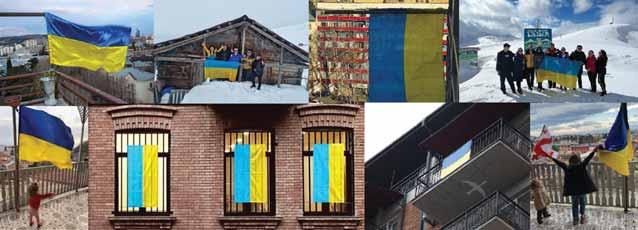
As a show of solidarity for Ukraine, Georgians launched the idea of “displaying the flag” to demonstrate their support and respect for the nation in the time of war, and Georgian citizens started to fly Ukrainian flags on their balconies.
company “Archi” and supermarket chain “Magniti” rallied to support the initiative. Various universities, including Tbilisi State University, Medical University, Batumi University, Sokhumi University, and others were also enrolled in the humanitarian initiative.
Since the start of the war, several mil-
were given the opportunity to receive an education in their native language, and at the same time, to participate in non-formal education circles - sports, music and technology. As of December 1, 2022, more than 60 teachers from Ukraine had been employed by these Ukrainian sectors.
the "Open Society Foundation", the "Nino Katamadze Fund" created a space where Ukrainian children and adolescents who came to Georgia after the war engage in art therapy.


To support the academic staff at risk, with the involvement of the South Caucasus representation of the Konrad Adenauer Foundation, a Ukrainian language course was launched at "Ilia State University", which created an opportunity to learn Ukrainian language at an elementary level. There were other private initiatives too, and information about them is available on www.dopomoga.ge.
Since the immigration of Ukrainians to Georgia, apart from education, the need for legal assistance in a language that is understandable to Ukrainians has emerged. Especially considering that the services offered by state agencies are available in Georgian only.
On the freezing winter’s day of February 25, Georgian and Ukrainian national flags were flying. Friendly moral support grew even stronger in the days that followed - an increasing number of people gathering on the main avenue. And of all the protests that were held for this cause, the March 4 protest was particularly significant. On this day, the presidents of Georgia and Ukraine addressed their citizens.
“Today, I’m standing where Georgia should be standing. I’m standing by President Zelensky’s side, by the side of Ukraine. To stand beside our friend, who is fighting for freedom, independence, a European future, is to show the dignity of our culture, our traditions, our nation. We are with them; we shall remain so, and I would like to extend to President
In the wake of these events, a humanitarian aid center for Ukrainians was launched near the building of the Parliament, where the citizens could bring non-perishable food, jams stored in jars for the winter, pickled food, and fruity beverages. One could also see clothes, hygiene items and toys which had been donated. Later, the organizers would sort the collected items and send a portion of them to Ukraine, while the remaining half was distributed among the local Ukrainian refugees.

Following the outbreak of the war, Tbilisi City Hall opened a special bank account for donations. Moreover, a separate space was allocated within the municipal building to collect humanitarian items that were later sent to Ukraine.
Private enterprises like development
lion people have fled Ukraine. A large number of them took refuge in European countries, and a small portion chose
The government allowed the Ukrainians who had to flee their country due to the war to continue their studies at
The Office of the United Nations High Commissioner for Refugees offered Ukrainian citizens in Georgia free consultations on issues related to their refugee status via partner organizations, such as the Office of the Public Defender, non-governmental organizations: "Rights
Georgia as their destination. According to the data of the United Nations High Commissioner for Refugees, on May 9, 2023, there were 24,182 Ukrainians in Georgia. Most of them are from Mariupol and Kharkiv - cities that were particularly affected by the war.
In 2022 the humanitarian status was granted to 367 Ukrainians and 516 persons were registered as asylum seekers. A few weeks after the war started, it became apparent that getting a proper education would be a challenge for Ukrainian children. To this end, special programs were introduced in major Georgian cities (Tbilisi and Batumi) and a Ukrainian-language sector was established within the 41st Tbilisi Public School and 20th Batumi Public School.
In addition to this, for the 2022-2023 academic year, another Ukrainian-language sector was opened in the 220th public school in Tbilisi, and the Ukrainian-language sector of the 20th Batumi Public School was expanded. Students
state universities without needing to pass Entrance Exams. In addition, Kutaisi International University exempted Ukrainian students from tuition fees.
Georgia" and "World Vision Georgia". Other non-governmental organizations also offered legal assistance to Ukrainians: "Human Rights Center", "Sapari"
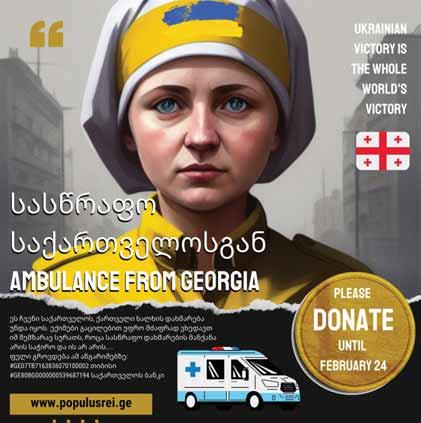
In large cities of Georgia, including Rustavi and Tbilisi, public kindergartens receive Ukrainian children free of charge. In addition to this, with the support of
with regards to women's rights, "Care Caucasus" and its partner organization "Human Rights Development Fund".
GEORGIA TODAY SEPTEMBER 15 - 21, 2023 6 POLITICS
Continued on page 7
Source: netgazeti, tabula, Radio Liberty
“გამოფინე დროშა• Встанови прапор”
Source: FB page
Source: Parliament.ge and IPN
Source: Formula, FB page Український Сектор, Ruslan Subbota.
Source:
“სასწრაფო საქართველოსგან Ambulance from
Source: Nino Katamadze Fund
FB page
Georgia”
18 Months of War - How Has Georgia Helped Ukraine So Far?
which Georgia upheld - 2;
• Other joint statements upheld by Georgia - 2.
EU:
• Declarations made by the High Representative on behalf of the EU - 11;
• Restrictive measures / Sanctions - 1. Other organizations/formats:
• Supported resolutions/recommendations/decisions/opinions/declarations - 6;
• National statements - 6;
• Statements of the European Union which Georgia upheld - 15;
Source: dopomoga.ge
Continued from page 6
There were other initiatives too:
• "Silknet" cancelled the international rates on calls from mobile phones and fixed networks to Ukraine;

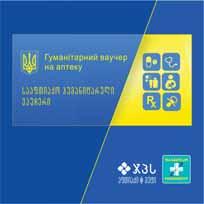
• "Tegeta" continues to support Ukrainians and offers employment to people displaced in the aftermath of the war;
• Cigar bar ‘Havana Club Tbilisi’ employs citizens of Ukraine;
• As a sign of respect, "Aura cottages" located in Kazbegi said it was ready to host free of charge the Ukrainian citizens stuck in Georgia;
• Kiwi Tours Georgia offered the citizens of Ukraine free transfers from the airport to hotels.
In cold winter days, when the war broke out, the main concern for those fleeing the bullets, along with survival, was housing. Volunteers Tbilisi was one of the first to start the process of housing Ukrainians. The efforts of "Open Society Foundation" should also be noted, which allocated 150,000 GEL to solve the housing problem and started to seek additional funds.
solidarity is with Ukraine and the Ukrainian people."
• "I will shelter 2 citizens of Ukraine.
Newcomers. I don’t mind if it's a mother and a child, sisters, or spouses. I live in an apartment building with my wife. We are mostly gone. Comfort and normal conditions. They can live with us for as long as they want. Rent free, of course."
• "I will shelter Ukrainian citizens who can't return to their homeland in Tbilisi free of charge."
• "We can host citizens of Ukraine, 4 people in a house out of town, rentfree. Location: Jighaura village, 2 km from Saguramo."
• “I can host several Ukrainian citizens completely free of charge in Guria, in the city of Lanchkhuti. If they are currently in the western part of the country, I can pick them up in my own car. I have a house with a green space. I will try my best to alleviate these difficult moments.”
Also, there were government initiatives to help Ukrainians with the housing problem. In July 2022, the government
Source: dopomoga.ge
certain medical services free of charge. Many of the medical services offered to Ukrainian citizens (beyond government services) are provided by private companies, including mental health support, which becomes even more important during war-caused trauma.
"Aversi Clinic" offered free one-time emergency medical assistance and a doctor's consultation to the citizens of Ukraine, while oncology clinic "Consilium Medulla" offered the first medical visit free of charge.
citizens. Within the framework of the campaign, more than 90,000 GEL was collected in Georgia to buy a new ambulance for Ukraine.
On February 24, 2023, on the first anniversary of the war in Ukraine, the Georgian government made an exception for Ukrainian citizens and extended their visa-free stay in Georgia up to two years.
Before that, Ukraine was in the list of more than 90 countries whose citizens could stay in Georgia for only 1 year.
Despite the fact that Russia had launched a full-scale attack on Ukraine, from the very first days of the war, Georgian diplomatic missions continued to work. This was, on the one hand, helping Georgia’s citizens, and on the other hand supporting Ukraine. Furthermore, an additional consular post was launched in Lviv.
• Other joint statements upheld by Georgia - 7. The attack on Ukraine was not only an attack against a friendly country, it was an attack against the world, including Georgia, which had its last war with Russia in 2008, and the “creeping occupation” continues to this day. That is why the Georgians, who have been fighting for Ukraine's independence for the last months and years, are selfless. Dozens of Georgian military are fighting against Russia in Ukraine, and more than 50 of them have died on the battlefield.
List of fallen warriors:
1. Aleksandre Khuskivadze
2. Nikoloz Akhvlediani
3. Archil Devrisashvili
4. Malkhaz Kvizhinadze
5. Joni Odishvili
6. Zviad Gigani
7. Giorgi Gorelishvili
8. Nika Jikashvili
9. Zurab Odishvili
10. Arsen Ketsbaia
Source: aversiclinic.ge
In the beginning it was possible to receive emergency outpatient care and remote consultation in 33 branches of "Evex'' clinics. In addition to this, the EKIMO application could provide Ukrainians with a necessary consultation free of charge. Pharmacy network GPC allocated up to 1 million GEL in humanitarian aid, and provided Ukrainians in Georgia with the opportunity to get the necessary medications for free within 100 GEL.
In this case too, there were initiatives by individual doctors:
• "I declare full support for the Ukrainian state and the Ukrainian people! I am ready, within the scope of my official competence [as traumatologistorthopediatrician] or global knowledge, to serve all Ukrainians free of charge and offer them consultation and any procedural manipulation. Services can be provided both in the clinic and online.”
Source: Open Society Foundation
At that time, one of the most important platforms was relocation.ge. "Caritas Georgia" also made a great contribution to the process of settling Ukrainians in Georgia. Furthermore, there were private initiatives which were posted in Facebook group Spend 4 Seasons in Georgia:
• "Friends, if you know citizens of Ukraine who cannot return to their motherland due to the start of the hostilities, I will give them refuge in Kvesheti (in the middle of Gudauri and Pasanauri). I can host many people; the space is big enough. All the conditions necessary for life are in place. Please put me in touch with these people if you have any information! P.S. Today, the fate of our country is decided in Ukraine, my
issued a decree according to which Ukrainian citizens in Georgia received 300 GEL per month (per family) to cover the housing costs and an additional 45 GEL for each family member.
Tbilisi City Hall offered some free-ofcharge services to Ukrainian citizens residing in the capital. With proof of citizenship, they can travel by public transport, receive services in municipal sports centers (including swimming pools), museums, theaters, media libraries, art schools, and student youth palaces without any fees.
Citizens of Ukraine who entered the country from February 1, 2022 to May 1, 2023 and are permanently (continuously) residing in Georgia are entitled to receive

At the end of 2022, as the winter season returned once again, Russia attacked Ukraine's energy facilities, leaving the war-torn country in need of generators to produce electricity. Ukraine appealed to all partner countries, including Georgia, asking for help. In response, the Government of Georgia sent 25 highpower generators to Ukraine at the end of December 2022.
Earlier, on December 15, 338 generators were handed over from “the Georgian people to the brave Ukrainians”, including two units for water supply systems in Boyarka and Khmelnytsk, and the rest for kindergartens, schools and makeshift medical centers in the Kyiv region. This equipment was purchased with 490,000 GEL raised within the framework of the project "Share the Light" launched by volunteers to help the Ukrainians at war. Another initiative "Ambulance from Georgia" belongs to the same group of
From the very first days of the war, the representatives of the Georgian government declared that Georgia would not be joining the sanctions against Russia. Nonetheless, Georgia is involved in the implementation of important sanctions imposed by the European Union and the USA. A few days after the war broke out, the representative office of the sanctioned Russian bank (“VTB”) was closed in Georgia - "VTB Bank" was sanctioned due to the war in Ukraine, and prohibited from transferring in dollars, euros, pounds and other foreign currencies.
One of the latest sanctions implemented against Russia that Georgia is currently enforcing is the restriction of the export of vehicles to Russia. "The restriction on re-export/export of vehicles imported from the United States of America to Georgia has been enforced since August 1, and the restriction on those imported from Europe will be enforced from September 26, as envisaged by the 11th package of imposed sanctions."
The most important thing that the representatives of the Georgian government undertake as an example of supporting Ukraine is joining the statements and resolutions initiated by leading international organizations. According to the data of the Ministry of Foreign Affairs, there are dozens of such documents.
UN and its specialized agencies:
• Supported, sponsored resolutions/ decisions - 32;

• National statements - 131;
• Statements of the European Union which Georgia upheld - 92;
• Other joint statements upheld by Georgia - 63;
• Other supporting initiatives - 23.
OSCE:
• Supported, sponsored resolutions/ documents/declarations - 2;
• National statements - 92;
• Statements of the European Union which Georgia upheld - 131;
• Other joint statements upheld by Georgia - 5;
• supporting initiatives - 14.
Council of Europe:
• Supported resolutions/recommendations/decisions/declarations - 25;
• National statements - 36;
• Statements of the European Union
11. Vakhtang Barabadze
12. Davit Kuchukiani
13. Mikheil Mazanashvili
14. Ilia Chokheli
15. Giorgi Kaadze
16. Mikheil Tevdoradze
17. Sergo Lisikh
18. Ruslan Bayramov
19. Roland Kvaratskhelia
20. Avto Rurua
21. Romeo Pichkhaia
22. Merab Aladashvili
23. Badri Markelia
24. Jambulat (Jaba) Khopheria
25. Konstantine Kursua
26. Ernest Macharashvili
27. Temur Macharashvili
28. Levan Sakhelashvili
29. Guga Gagnidze
30. Aleksandre Martiashvili
31. Mikheil Kaplanishvili
32. Edisher Kvaratskhelia
33. Kiril Shanava
34. Gela Gogia
35. Berdia Jokhadze
36. Kakha Gogol
37. Aluda Zviadauri
38. Daniel Gerliani
39. Giorgi Grigolia
40. Rati Shurghaia
41. Tato (Telman) Bigvava
42. Vitali Orbeladze
43. Zaza Bitsadze
44. Alika Tsaava
45. Arkadi Kasradze
46. Nikoloz Shanava
47. Davit Menabdishvili
48. Davit Gobejishvili
49. Bakhva Chikobava
50. Gia Beriashvili
51. Davit Ratiani
The material was prepared and published with financial support from the US Agency for International Development (USAID). The published material is the responsibility of Dopomoga Ukraini (dopomoga.ge) and does not necessarily state or reflect the views and opinions of the US Agency for International Development (USAID) or the government of the United States.

GEORGIA TODAY SEPTEMBER 15 21, 2023 7 POLITICS
The Caucasus Is Fast Becoming an AI Tech Hub
Georgia Today, GT Business and The Marriott are sponsoring the Georgia & Armenia Tech/AI Hub Summit on September 21 in the Tbilisi Marriott in the Grand Ballroom, followed by a networking luncheon at the Parnas restaurant. As such, it is timely to speak about AI, especially considering we have received a myriad of questions about AI and the relevant law. This article was thus created with contributions from Anna Kravtsova, IT Lawyer from Klein & Pantsulaia and Klein & Iskandaryan based in Portugal, and Prof. Jose Romero, also of Klein & Pantsulaia. Everyone is talking about AI these days, and while lots is certain about AI, there is as much uncertainty as well. This is especially true concerning the future of the job market, green uses, nefarious uses and legal issues.
JOBS & THREATENED
INDUSTRIES
If you ask IT companies, most would say that AI will help their business and that it won’t lead to layoffs. Some would say that it means upscaling certain staff and leaving them to do more efficient tasks, and as such their companies will be better off and will boost their P&L. Are they in denial? Well, it’s early days, so perhaps too early to judge. An example of a potentially vulnerable IT subindustry is software testing. Humans are employed to see if, for example, when you press “Print,” the printer does its job and does indeed print. Software testing software is available now, so maybe these jobs (and even the software testing industry itself) are under threat. Another stark example of potential job losses is large publishing houses. In June, German`s largest publisher Axel Springer
laid off 20% of its newsroom; jobs where employees were compiling news sources to create content, now replaced by AI. Our law firm realized a while back that law firms and accounting firms also have grim futures. In response, we are launching IT business consulting and AI consulting to complement our general legal practice. AI business consulting services are being done through a joint venture with a 30 person strong AI business consultancy team.

IMPROVED EFFICIENCIES; GREENING
According to Iosep Khutsishvili of Georgia`s MaxinAI (also a speaker at the aforementioned conference and AI Workshops at the Tbilisi Marriott) their company consults firms to improve effi-
ciencies in a wide range of industries. One poignant example of this is when MaxinAI helps power plants increase efficiency (greenhouse gas reductions) and assists manufacturers to save costs; actually, to save on waste in production processes. So AI has lots of greening potential and is not all about job losses.
AI IN THE WRONG HANDS
We have all read scary stories about how cybergangsters use AI to create fake impressions of people to ask family members for money. There are numerous examples and, as time goes on, it seems unfortunately likely that new creative scams and cases of misuse will rear their ugly heads, as with any tech evolution or pioneering invention (planes were thought to be the godsend inven-
(IP); ONLINE NEWS OUTLETS
There is an issue whereby companies or individuals using the likes of ChatGPT could be infringing on someone else’s IP. Many news outlets who make a lot of their income based upon the model that their news articles are on news. google.com are wrangling to hang on to their revenue streams since someone authoring a news article can use AI to create news content, and so the news sources won’t be compensated by google. Theoretically, it is possible to become very rich by writing such articles (without cost) and getting lots of hits that generate traffic-based ad dollars.
WHO OWNS THE AI GENERATED IP?

tion until we saw what happened in last centuries’ big wars).
GEORGIA & ARMENIA - AN AI TECH HUB
With both Georgia and Armenia experiencing a booming tech sector due to the huge IT talent pool, there is no shortage of start-ups and young companies acting as AI IT backoffices (piggy-backing on low IT worker wages) in the Caucasus, while Western company/clients are indirectly using the local talent to create and modify these company’s AI, or assisting to improve process efficiencies.
A FEW GLARING LEGAL ISSUES
INFRINGEMENT OF THIRDPARTY INTELLECTUAL PROPERTY
That is the question of the day. That will depend on what percent of the AI was created by AI and the contribution of the person who created it. The laws are in their early days of development, and they are now and always will be different for the US, EU, Georgia etc. There are a myriad of other IP and other legal issues and they will not be touched upon in this weeks’ column but may be discussed in future. Again, the event which will feature Special Guest DataArt will be at the Tbilisi Marriott on 21st of September. If you’re interested in finding out more, please visit www. kleinlawgroupgeorgia/events/ai.
Georgia’s August Tourism Revenue Reaches $550 Million, According to Galt & Taggart
BY MARIAM GORKHELASHVILI
Source: commersant.ge
Georgia’s Exports Surge to $492 Million in August
BY MARIAM GORKHELASHVILI
In August, exports worth 492 million dollars were carried out from Georgia abroad, the National Statistics Office of Georgia reports. The mentioned data is 4% or $19 million more compared to the previous year.

According to the preliminary report on foreign trade, during the first eight months of 2023 (January-August), Georgia’s
exports amounted to $4 billion, which is 14.3% more than the previous year.
Import in the first eight months of this year amounted to $9.9 billion, compared to the same data of the previous year, the import has increased by 18%. Only in August, Georgia received $1.27 billion worth of imported goods, which has increased by 1% annually.
The National Statistics Office of Georgia will present a detailed foreign trade report, through which we will learn what goods exports and imports increased during August, on September 19.
In August 2023, Georgia’s tourism income stood at $550 million, as reported by the investment bank Galt & Taggart. Compared to the previous year, there was a modest 5% increase in revenue for that month.
“According to our estimation, in August 2023, revenues from tourism increased

by 5.2% annually and amounted to 550 million USD. In total, we estimate tourism revenues to reach $2.9 billion in the first 8 months of 2023, an annual increase of +34.7%,” – Galt & Taggart said in a review.
It’s worth noting that since 2023, the National Tourism Administration has reduced the transparency of statistics. Previously, monthly visitor numbers were published, but now only quarterly figures are available. Consequently, there is currently no information on the pre-
cise number of visitors Georgia received during the tourist season. Additionally, the origin countries of visitors in the past month remain unknown. Regarding the methodology, it’s important to highlight that the tourism statistics exclude migrants who have relocated to the country, a demographic that has seen a significant surge in the last two years. This approach to accounting for tourism aligns with the guidelines set forth by the UNWTO, or the World Tourism Organization.
GEORGIA TODAY SEPTEMBER 15 - 21, 2023 8 BUSINESS
Source: beachsearcher.com
Image source: neurosciencenews
The Current Year Has Started Successfully for EFES Georgia, says EFES Georgia GM Veli Dincel
INTERVIEW WITH EFES GEORGIA GENERAL MANAGER, VELI DINÇEL
We have introduced new and highly successful brands to the market, says EFES Georgia GM Veli Dincel of Efes Georgia successes in 2023 so far. “We started several big projects in the direction of corporate responsibility. We have also received another international quality management certificate. If we only mention these achievements, we can already say with certainty that the current year has started very successfully for EFES Georgia.
“Comparing 2022 to 2023, we can confidently state that we have experienced overall growth for our business. In particular, the beer category within key accounts has shown impressive expansion in 2023 so far. Furthermore, we have observed a moderate increase in the HoReCa segment, encompassing the beer and CSD categories. It's worth highlighting that our export statistics indicate significant growth in both the beer and CSD categories during this period with high-double digit growth momentum,” he notes.
EFES GEORGIA PRESENTED THE NEW GEORGIAN PREMIUM CRAFT BEER TAATI. PLEASE TELL US ABOUT THIS NEW BRAND.
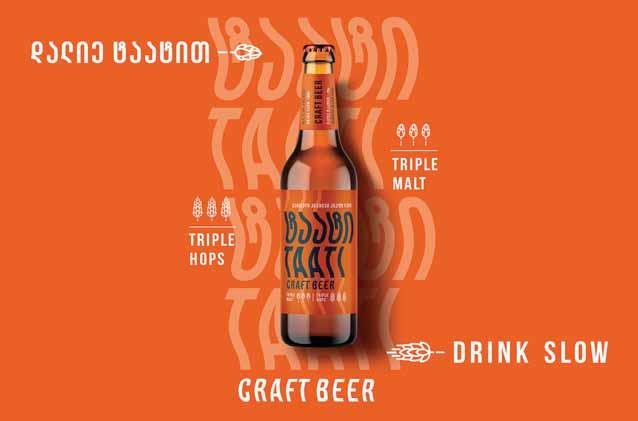
Taati is made using three types of topquality malt and three special aroma hops. Taati beer is produced in limited quantities with a special brewing method, which gives the liquid a unique flavor. In its aroma, you will feel a balanced combination of herbs with floral notes. When tasting, you can feel tropical fruits, which come from special hops produced in New Zealand and Australia.
Taati is a Georgian word and means to move at a slow, unhurried pace. We recommend drinking Taati slowly, allowing each sip to reveal the harmonious fusion of these exceptional ingredients.
LET’S TALK ABOUT YOUR GREAT INITIATIVE IN THE FIELD OF SUSTAINABILITY, WHICH IS CALLED EFES GEORGIA ENTREPRENEURSHIP PROGRAM.
Sustainable development is one of the priorities for EFES Georgia. The company is currently working on several projects that aim to protect the environment and resources, as well as improve the environment for the future generation of Georgia. This year, EFES Georgia has successfully passed the ISO 14001 audit and received certification for its Environmental Management Systems. The aim of EFES Georgia’s Entrepreneurship Program is to support Georgian visionaries and entrepreneurs for the sustainable development of the country.
EFES Georgia is running different environmental projects, including wastewater treatment, plastic reduction, energy efficiency, etc.
Sustainable Entrepreneurship Program
‘Go Green’ is implemented by EFES Georgia, Impact Hub Tbilisi and Startup Büro and aims to support sustainable entrepreneurship by empowering earlystage startups and individuals. During the program, the participants deepened their knowledge in several areas: product development and validation, customer segmentation, value proposition, marketing, branding, advertising, sales, Growth Marketing, MVP - technical product creation, business model and finance, Pitch Deck and fundraising.
After completing the program, the startups/companies had a business plan, business model, financial plan, communication strategy, product prototype or technical plan for its implementation, Pitch Deck and investment proposal to seek funding sources.

At the final stage, the Go Green preaccelerator demo day was held, where the participating startups presented the results of their 12-week work. About 60 startups took part in the qualifying round, 9 teams were selected by us based on the interview. It was a 12-week project - a kind of education. Specialists of the field were involved in it. We prepared
is the very first company to participate in the Forest Friend volunteer program for the care of forests in Georgia, and the new brand of EFES Georgia - EFES Special became the partner of this particular project. Rather than talking directly about our activities and our support, I would like to briefly introduce you to what EFES Georgia does in the direction of environmental protection and what we contribute to our environment. Within the framework of the Forest Friend project, the EFES Special started to take care of the renewal of 12.1 hectares of forest located in the Simoniantkhevi quarter of the Tianeti forestry area (in the Mtskheta-Mtianeti region). As a result of this program, the ecosystem will be restored and the ecological situation will be improved; additional opportunities will appear for the locals,
with our consumers. By purchasing EFES Special, you become a friend of the project and a friend of forests at the same time.

TELL US ABOUT THE BRAND; WHAT MAKES EFES
SPECIAL SO SPECIAL?
EFES Special is a special beer series crafted using special brewing techniques. Through long brewing, cold filtering, and careful cultivation, the beverage gains a delicate and smooth flavor. With its distinctive packaging, delightful taste, and light color, this beer promises a new experience for consumers.
both in terms of market volume and quantity, it is one of the main priorities and perspectives of our growth. From this point of view, we intend to increase our investments and export Georgian products to other countries. Also, we want to activate communication with customers in the existing export countries to raise the awareness of our brands, thereby strengthening our position in the market.
WHAT CAN YOU TELL US AND HOW WOULD YOU EVALUATE, FROM YOUR POINT OF VIEW, THE COMPETITIVE ENVIRONMENT IN GEORGIA AND THE GEORGIAN BEER MARKET IN GENERAL?
With so many players in the beer market, competition is high. But EFES Georgia has been an obvious market leader in the beer sector over the years. As for high competition in Georgia, we are sure this is good for consumers because they get better quality, more varied products and services tailored to their needs from competing companies.
MEMORANDUM. PLEASE SHARE THE DETAILS OF THIS CAMPAIGN.
We have to underline that EFES Georgia
36,000 trees will grow, 2090.6 tons of oxygen will be produced and emissions of greenhouse gases will be reduced.
The Forest Friend platform was established with the noble goal of bringing society together to care for, maintain and restore the forests of Georgia. This initiative was made possible with the financial support of the Biodiversity Financing Initiative of the United Nations Development Program (BIOFIN), and its main partner is the National Forestry Agency of Georgia.
We are glad that we now have the opportunity to take care of the challenges facing the forests of Georgia together
THANKS FOR THIS COMPREHENSIVE INFORMATION. A LOT OF IMPORTANT AND VALUABLE NEWS HAS BEEN COLLECTED FOR YOU THIS YEAR...
WHAT IS THE EXPORT POTENTIAL OF THE INDUSTRY AND WHAT IS OUR COUNTRY DOING IN THIS REGARD?
The volume of beer exports to global markets is increasing every year. Georgia as a country exports 4.7 million liters of beer every year. Currently, EFES Georgia exports beer and lemonade to 23 different countries. The direction of export in our company has been developing over the years,
Finally, I would like to mention that by the end of September, Oktoberfest will start in Georgia with our licensed brand, Lowenbrau. Lowenbrau is one of the 6 breweries that have the right to participate in Oktoberfest. It should be noted that Lowenbrau has been sold at every Oktoberfest since 1810. Let’s celebrate the real German festival with real German beer, Lowenbrau! Cheers..
GEORGIA TODAY SEPTEMBER 15 21, 2023 9 BUSINESS
the startups so that they were ready for the next stage - financing.
ENVIRONMENTAL PROTECTION IS ONE OF THE IMPORTANT PARTS OF RESPONSIBLE BUSINESS. IN 2023, EFES GEORGIA, IN COOPERATION WITH THE NATIONAL FOREST AGENCY, STARTED A NEW CAMPAIGN REGARDING FOREST PROTECTION BASED ON A SPECIFIC
Re-Roofed: Kutaisi
large tree on the church grounds for some German tourists when I arrived, with many other onlookers. I took the opportunity for some photos with a slow shutter speed of about 1/10 second to blur the panduri playing while trying for enough sharpness in their faces. Then I went inside the cathedral, where a service was underway, and admired the reconstruction from this point of view. Not wanting to disturb, though, I didn’t stay long. Back outside, to open the tripod and try for some shots of 10-20 seconds as evening fell and the lights showed the church’s exterior. Clouds moving by would blur nicely at this exposure time. My current camera, a Canon EOS 77D, is new enough to have both wi-fi and bluetooth connectivity, so I set up and used this function for the first time to enable remote triggering of the shutter from my iPhone. This would eliminate camera shake from my physically pressing the shutter button. The shots I got, viewable instantly in-camera, were all I
BLOG BY TONY HANMER
Ihad an unusual request the other day, but one which we are equipped to handle: taking guests from Georgia’s second city, into which they had flown from Belgium, to our house in the mountains. This required an overnight hotel stay in the city center (covered by the guests) as they only arrived in the middle of the night. Then I would arrange other transport for them from Mestia to Adishi; and finally take them from Ushguli back down to Kutaisi, with another overnight stay, for their departure home. In between, they would hike and camp in Svaneti.
I enjoyed the rare opportunity to see a bit of Kutaisi at leisure, and was delighted to find that my hotel room’s window looked out on Bagrati Cathedral, which I had not seen up close since its re-roofing in President Saakashvili’s time. This time I had a new tripod with me, and as dusk was not far off, I walked to the church to see how it looks now.
Bagrati was built during the reign of Bagrat III, early in the 11th century, hence its name. 1692 saw its cupola and ceiling collapse after a cannonball shot from the invading Ottoman army, and the church was left roofless for over three centuries. This is how I first saw and photographed it, visiting in the early 2000s. I have to say, the image and existence of a place of worship of God open
to the sky has a certain theological rightness: No barriers to the Holy One here! Of course, it was also in a damaged state (more symbolism?) And, one of the four main cathedrals of Georgian Orthodoxy, under threat of continuing weather-based deterioration. Saakashvili’s government undertook the re-roofing about a decade ago, and in doing so caused the church to be removed from UNESCO World Heritage site status, which, together with nearby Gelati Monastery, it had gained in 1994. So there is controversy here. But now, complete again, it looks beautiful (the elevator not dominating the view!), with a green-patinated roof and cupola.
A small Georgian men’s choir in traditional costume was performing under a
was hoping for. In processing, I decided to make everything black and white, a trend I am going with for most of my work now, to avoid the distraction of color and concentrate on composition and exposure. Color is now the exception in my work, though it still has its place.
Kutaisi offers far more than just Bagrati Cathedral for the tourist, but for my few hours and the desire not to rush, it was plenty. I’ll be back there in a couple more days to see and shoot what else is on offer.


Tony Hanmer has lived in Georgia since 1999, in Svaneti since 2007, and been a weekly writer and photographer for GT since early 2011. He runs the “Svaneti Renaissance” Facebook group, now with over 2000 members, at www.facebook.com/groups/ SvanetiRenaissance/
He and his wife also run their own guest house in Etseri:
www.facebook.com/hanmer.house.svaneti
UNDP and Germany Promote Social Integration of Ukrainian Nationals Living in Georgia
The newly inaugurated Ukrainian House in Tbilisi marks a significant milestone in enhancing support for Ukrainian nationals living in Georgia. The initiative is spearheaded by the Ukrainian community organization “Georgian-Ukrainian Platform” with support from the Government of Germany through the United Nations Development Program (UNDP).
The Ukrainian House stands as a symbol of unity and collaboration, committed to supporting Ukrainian nationals who sought refuge in Georgia amidst the devastating war that inflicts unmeasurable suffering upon the Ukrainian people and has profound global repercussions.
This multifunctional space, situated in the heart of Tbilisi, will address the needs of Ukrainian non-governmental organizations and volunteer groups committed to assisting Ukrainian beneficiaries in Georgia. The Ukrainian House will serve as both a communal hub, an operational office space, and a referral point for various socio-economic services tailored for Ukrainian nationals.
In addition to its core mission, the Ukrainian House will be a focal point for cultural exchange. Its dynamic calendar of events will cater to both adults and children, fostering integration and enhancing the growth of GeorgianUkrainian relations.
The Ukrainian House officially opened its doors on 13 September 2023, during a ceremony attended by Tanja Hutt, Deputy Head of Mission, German Embassy in Georgia; Oleksandr Shulha, charge d'affaires of Ukraine in Georgia; Anna Chernyshova, UNDP Resident Representative a.i. in Georgia, Valentina
Marjanishvili, Head of the GeorgianUkrainian Platform, and members of the Ukrainian community in Georgia.
“Germany is proud to contribute to the establishment of the Ukrainian House in Tbilisi. We are confident that this vibrant space will offer support to various Ukrainian community groups in Georgia, while actively fostering social integration," said Tanja Hutt.
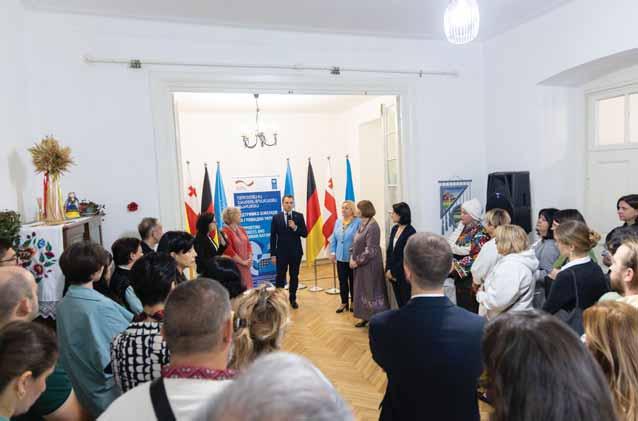
“Russia’s full-scale invasion of Ukraine has led to the largest refugee crisis since the Second World War,” Anna Chernyshova noted. “Nearly one-third of the Ukrainian population was forced to flee their homes, including more than half of all Ukrainian children. Around 25,000 found shelter, security and hope in Georgia, and UNDP, with the generous support of Germany, is committed to assisting them. We're establishing a community space for Ukrainian civil society organizations, providing grants to entrepreneurs, and offering vital support for employment, recovery, and integration.”
"The establishment of the Ukrainian House reflects the close ties between Georgia and Ukraine,” said Valentina Marjanishvili. “This space will offer practical assistance to Ukrainians living in Georgia and will foster connections and nurture talents within our community through cultural and educational events.”
The establishment of the Ukrainian House in Tbilisi is part of UNDP’s broader efforts, funded by the Government of Germany, to support refugees and Ukrainian nationals living in Georgia. ln partnership with CARE Caucasus, UNDP boosts economic recovery and income generation for refugees and Ukrainian nationals by creating a grants programme
for entrepreneurs and providing business training, employment advice, and job-matching services within Georgia's private sector. ***
IMPROVING THE RULE OF LAW AND ACCESS TO JUSTICE PROJECT
With US$1,627,701 in funding from Germany, UNDP implements the Improving
the Rule of Law and Access to Justice project aimed at strengthening the principles of the rule of law in Georgia and enhancing resilience and access to justice for vulnerable communities. The initiative draws on collaboration with the Georgian authorities, civil society organizations, and the UN High Commissioner for Refugees. The project also engages in regional cooperation with civil society organizations and rule of law professionals from Armenia,
Moldova, and Ukraine, while maintaining coordination with the German Embassy in Tbilisi.
GEORGIAN-UKRAINIAN PLATFORM:
The Georgian-Ukrainian Platform is a community organization based in Tbilisi, dedicated to promoting cultural exchange, fostering a sense of belonging, and supporting the needs of Ukrainian nationals and refugees in Georgia.
GEORGIA TODAY SEPTEMBER 15 - 21, 2023 10 SOCIETY
The opening of The Ukrainian House. Photo by UNDP/Leli Blagonravova
Georgian Poetry by Murman Lebanidze and Mukhran Machavariani

I will buy you chintz, yellow and red And you embroider the White cloth for me! Spring has come, Len!
I have made you miss. The plowed field And the forest, The smell of the elder, Crushed by the heel, Far, the dome of Betania church And blue, unfettered day…
I have made you miss The plowed field And the forest!
I
TUKHARELI
Untitled, by Murman Lebanidze: Spring has come, Len! The birds have made Their nests…
SPORTS
Around is heard
The twitter of birds…
I’ll buy you Flowery chintz, And you embroider The white cloth for me! Spring has come, Len!
THE GEORGIAN LANGUAGE BY MUKHRAN MACHAVARIANI:
Is Georgian only a language!?
It is the Georgians’ belief?
It is God!
It is destiny!
It is as large as the sea!
***
Mukhran Machavariani was a Georgian poet, a member of the Supreme Council of the Republic of Georgia from 1990 until 1992, and a recipient of the Shota Rustaveli Prize of Georgia. From 1988 until 1990 he was the Chairman of the Union of Georgian Writers. He died during a performance at Rustaveli Theatre in Tbilisi.
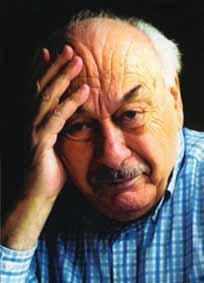
From 1946, Murman Lebanidze worked in the editorial offices of youth literary magazines and newspapers, then as the
chief editor of the Committee of the Printed Word of Georgia. From 1978, he was the secretary and then chairman of the Shota Rustaveli State Awards Committee. He was the president of the Rustaveli Society. He published his first
collection of lyric poems in 1950. He won Shota Rustaveli and Galaktion awards, claimed a Medal of Honor, and in 1995, was elected an Honorary Citizen of Tbilisi. Murman Lebanidze is buried in Didubi Pantheon.
Losing, in a Curious Way, is Winning
Australia vs Georgia. Source: Reuters
BLOG BY NUGZAR B. RUHADZE
The American writer Richard Bach once wrote: “That’s what learning is, after all; not whether we lose the game, but how we lose and how we’ve changed because of it, and what we take away from it that we never had before, to apply to other games. Losing, in a curious way is winning.” These golden words might be very true in the case of the Georgia
national rugby team, nicknamed ‘The Lelos’ and representing Georgia in the men’s annual Rugby Europe Championship and Rugby World Cup, which takes place every four years.
I don’t feel embarrassed at all to state aloud, as well as in black-and-white, that the Georgian Lelos lost to the Australian Wallabies, albeit the score was somewhat embarrassing, I will admit – 35 to 15. This happened in France, on September 9. What a day! I was right there, at the Stade de France, the national stadium of France, located north of Paris, whose seating capacity of 80,698
PUBLISHER & GM
George Sharashidze
COMMERCIAL DEPARTMENT
Commercial Director: Iva Merabishvili
Marketing Manager: Natalia Chikvaidze
EDITORIAL DEPARTMENT:
Editor-In-Chief: Katie Ruth Davies
makes it the sixth-largest stadium in Europe.
The day was very warm and humid, which did not bother us at all, with such an outstanding sporting event in store for us. I was well equipped with moral preparedness for any possible outcome, but in my heart of hearts I still nursed the hope to win. The arena was packed full, with way more Australian fans than those rooting for Georgia, but this was OK too. What was not quite OK, though, is that we gave the adversary the chance to get the upper hand, having started the first half very weakly and without any vestige of rugby
Journalists: Ana Dumbadze, Vazha Tavberidze, Tony Hanmer, Emil Avdaliani, Nugzar B. Ruhadze, Michael Godwin, Mariam Gorkhelashvili, Mariam Mtivlishvili, Erekle Poladishvili
Photographer: Aleksei Serov
discipline. The Australian rugby players deserve more respect, caution and thought on our part. They are, after all, a Tier One team. We were almost totally deprived of the ball from the very beginning of the match. Defense would never be able to endure the tension for long with that much passivity and indifference. The Wallabies rushed forward too far into the score, and there was no way to catch up. There did come a chance or two to turn the tables on our rivals, but even that chance was not used to the fullest extent – several absolutely realistic chances were lost to score a try. But let’s pick up courage, we have not yet used all our sporting power, and there is still time until the next game, the incipient clash with the Portuguese on September 23. There are not many countries in the world who have a team deserving of participation in the Rugby World Cup Only 20 national teams won the bid to compete in it this year, the ongoing tenth men's quadrennial world championship taking place in France from 8 September to 28 October. Among them was our little Georgia, and, losing or winning, we will still take away something very important: experience, publicity, and further chances to stay and shine in the big rugby global family. No other Georgian sports team has done as much as our rugby knights to make the world conscious that we are here to be recognized as a nation. Suffice to mention that Georgia’s participation in the Rugby World Cup has greatly contributed to the French budget, and that should count: 80,000 tickets at an average price of 50 Euros would make four million. How about that? Jokes aside, the Georgian rugby idea, its realization
Website Editor: Katie Ruth Davies
Layout: Misha Mchedlishvili
Webmaster: Sergey Gevenov
Circulation Managers: David Kerdikashvili, David Djandjgava
and its potential for good, seems to be shocking for any analyst that gives serious thought to this very promising Georgian phenomenon. It was said a thousand times, and I am ready to reiterate, that Rugby is in our blood via our gorgeous old-timer Lelo, the rugbyrelated ballgame, played in this land since time immemorial.

Returning from the Stade de France, a little saddened and slightly frustrated, two things chilled me pleasantly to my bones. One was the behavior of the crowd when walking to the metro station: all of us kept an affordable solid distance from one another, not disturbing the fellow-walker even for an instant. That’s how Europe marches to its destination! The second one was a totally unexpected patriotic French song, sung by the passengers in the metro car for the delightful reason that France had defeated New Zealand a couple days before, and because Australia, their western brother, had won the game that day. This was the sign of solidarity and the sense of spontaneity of personal liberty. Europe, again and again!
And last but not least, before the match, the Georgian National Rugby Union, headed by Joseph (Soso) Tkemaladze and The Georgian Wine Agency, represented by its deputy head David Tkemaladze, sponsored a reception for local and visiting rugby fans and lovers at the Berlioz Hall of International Paris Le Grand. The program, led by your obedient servant, included the majestic group of folk singing, the legendary ‘Georgian Voices’. The event once again corroborated that Georgian rugby is ready and poised to gloriously remain on the world rugby map forever.
ADDRESS 1 Melikishvili Str.
Tbilisi, 0179, Georgia
Tel.: +995 32 229 59 19
E: info@georgiatoday.ge
F: GeorgiaToday
ADVERTISING & SUBSCRIPTION
+995 555 00 14 46
E-mail: marketing@georgiatoday.ge
Reproducing material, photos and advertisements without prior editorial permission is strictly forbidden. The author is responsible for all material. Rights of authors are preserved. The newspaper is registered in Mtatsminda district court.
Reg. # 06/4-309
GEORGIA TODAY SEPTEMBER 15 21, 2023 11 CULTURE GEORGIA TODAY
TRANSLATED BY KETEVAN
will not make you Stay at home anymore, You will not call The family “prison”, Make quick boy Go along the path –And make him, Like a greyhound, run ahead fast! I will not make you Stay at home anymore.
Spring has come, Len!
Mukhran Machavariani


































Exciting News: Seasonal Travel Guide Where.ge is Back! Book your ad placement for the next issue! +995 32 229 59 19 any@where.ge info@georgiatoday.ge

 BY KATIE RUTH DAVIES
BY KATIE RUTH DAVIES


 BY MARIAM GORKHELASHVILI
BY MARIAM GORKHELASHVILI















































